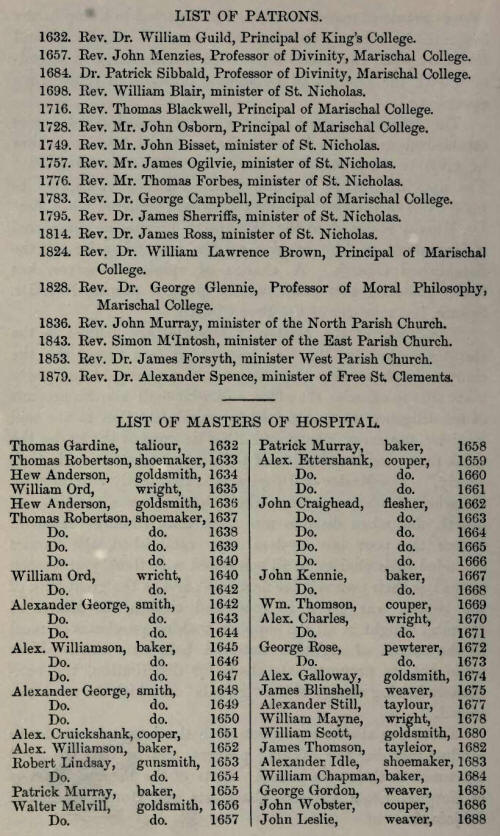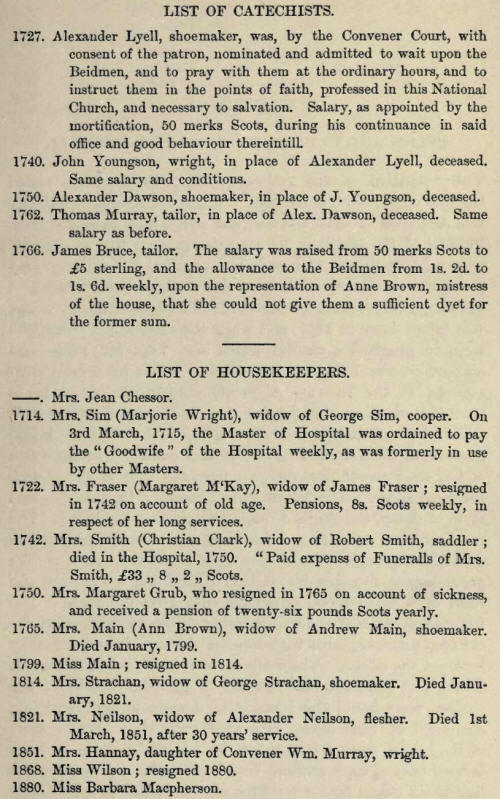|
Prior to 1609 aged and
decayed craftsmen were admitted into St. Thomas' Hospital, an
institution founded by Canon Clatt for the reception and maintenance of
indigent and decayed burgesses, merchant and craft alike; but by the
following Act of Council the craftsmen were excluded, and its entire
benefits monopolised by the merchant class of burgesses or guild
brethren :—
1st March, 1609.—The said
day the provost, baillies, new and auld counsall, considering that
divers persons his been admitted and received to the hospital of this
burght in tymes bygane wha hes not been burgess of gild, express against
the terms of the foundation of the hospital, be the whilk it is
specially provided that none sail be admitted thereto except decayed
brither of gild of this burght allenarlie. Therefore to avoid the said
abuse hereafter, and in respect that the rent of the said hospital is
given and mortified thereto be the brither of gild of this burght, and
be nane others, they enact and ordain that nane sail be admittet nor
received to the said hospital in tyme cuming unless that they be
burgesses of gild of this burght according to the tenor of the
foundation thereof. excluding hereby all craftismen of this burght,
extranears or utheris whatsomever from having ony place in the said
hospital in tyme cuming except burgesses of gild allenarlie unless the
foundation thereof be altered, and that livings be deited and mortifiet
thereto be craftismen.—Council Register, vol. xliii, p. 884.
This procedure on the
part of the Magistrates and Council —at that time almost exclusively
composed of merchant burgesses or guild brethren—of excluding the
craftsmen from the benefits of St. Thomas' Hospital, although resented
at the time, proved a blessing in disguise to the craftsmen, for it was
this exclusion from the town's hospital that induced Dr. Guild to found
an hospital for the craftsmen, an institution that in many ways proved
of great service and utility to the Trades. Originally only six Trades
were admitted to the benefit of the hospital—the Hammermen, Bakers,
«'rights and Coopers, Tailors, Shoemakers, and Weavers—the six Trades
which had the privilege of sending their deacons to vote at the election
of Magistrates. In 1657, however, a few months before Dr. Guild's death,
an agreement was entered into between the Convener Court, and " Andrew
Watson, deacon of the Fleshers, and John Craighead, late deacon of the
said traid, for themselves, and in name and behalf of the rest of the
freimen of the Flesher traid," whereby the Flesher trade was
incorporated along with the other six, and admitted to all the benefits
of the hospital on payment of four hundred merks Scots. This turned out
to be an exceedingly wise action on the part of the Flesher craft, for
it is a somewhat striking fact that the other crafts, who were not
embraced in Dr. Guild's foundation, including the Masons, Litstars,
Barbers, &c., who all had deacons at one time or other, have dropped out
of existence, while the Seven have thriven and prospered under this
visible bond of unity.
Under his deed of gift and charter of
administration, Dr. Guild reserved during his lifetime "the power and
patronage and direction in all things as shall seem most expedient to be
done," and, as appears from the Convener Court Books, he presided at a
number of meetings where additional regulations were drawn up for the
better administration of the hospital. In one of these regulations it
was made incumbent on every craftsman to make a freewill offering to the
hospital funds—freewill so far as the amount was concerned, but
compulsory in respect that no craftsman could reap any benefit from the
hospital unless he had made such offering. The funds of the hospital
were also augmented by a number of bequests and donations by the more
wealthy craftsmen, and in a very short time the institution became
thoroughly established and well supplied with funds.
In course of time, the severe and monastic
life imposed upon the inmates became very irksome, and very few of the
aged craftsmen were willing to submit themselves to its rigorous
discipline. The nature of the life that was led in this hospital may be
gathered from the following extracts from the deed of foundation:---
"I WILL also, that they be always present at
the Sunday and weekly sermons (unless they be confined to their beds by
sickness), as also at the public morning and evening prayers (especially
in summer). ALSO, I ordain that in their own chapel a portion of the
Word of God be read twice daily, and prayers offered up by a suitable
reader (who shall have fifty merks paid him therefor yearly), to be
properly chosen by the patron, which service shall be between nine and
ten in the morning or forenoon, and between three and four in the
evening or afternoon: and whoever (except through sickness) shall be
once absent, let him be admonished ; if twice, punished by the director
; and if thrice, removed from the hospital.
"I WILL also, that no woman dwell in the
said hospital (although the wife of one that is admitted), or stay
therein for a moment; and that no one who is admitted wander in any way
forth thereof through the town or streets ; and that they all be always
clothed with gowns of a single and decent colour ; MOREOVER, that the
said headmen be subject and obedient to the commands and admonitions of
the foresaid director, and that they be an honest, godly, and peaceable
conversation. And if any of them wander without, or be troublesome
within to any of their comrades, or commit any other fault, or be found
disobedient, or a breaker of the rules of this mortification, he shall
be punished in his person, or removed from the hospital, by the said
director, who, however, in this case shall take the advice and consent
of the foresaid minister of the Word of God and deacon-convener, who
have, and by these presents shall have power, one poor man dying or
removing from the said hospital or being otherwise withdrawn, to choose
and put in another poor man in his place, in form aforesaid.
"I WILL also, that one of the foresaid poor
men be janitor of the said hospital weekly, having the keys of the doors
and gates thereof (except the keys of the private rooms) ; and keep this
order—First, in the morning, he shall open the outer gate and the door
of the house and chapel at half-past seven hours, that they may go to
public prayers in the church, or to hear a discourse, and at that same
hour shall ring the bell a little, that by ringing thereof the rest
being awakened may make themselves ready for the foresaid exercises :
Next, the same janitor shall ring the bell regularly about the ninth
hour in the morning, and the third hour in the evening, to summon the
rest to hear prayers and the reading of the Scriptures in the chapel :
And from thence they are to go to their own private rooms, and use their
trade till the eleventh hour in the forenoon, and the sixth in the
evening, and then they shall assemble in the common hall, and under a
common president dine and sup together, the hebdomadar always publicly
giving thanks."
About the beginning of the present century the hospital became
tenantless, and a Decreet of Declarator was obtained from the Court of
Session, authorising the Master of Hospital to give grants of money to
those who objected to living in the hospital. Eventually the hospital
system was abandoned, and for many years the funds have been
administered in accordance with the Decreet of Declarator obtained in
1803. (See appendix.)
The office of patron to the Incorporated
Trades was established under the hospital charter, which lays down that
he must be "a preacher of the Word of God at Aberdeen." The appointment
is for life, unless the patron chooses to resign, one of the few
instances of which occurred when Rev. Dr. Murray resigned at the
Disruption because he considered it incumbent on him to give up the post
when he left the Established Church. A change of opinion, however, has
taken place on this point, as the present patron, Rev. Dr. Spence, is a
minister of the Free Church.
The duties of the Master of Hospital are
defined in the statutes passed by the Convener Court (see Chap. II.),
the charter simply stating that he must be "a diligent and godly man,
able to exercise the office, and who shall give an account of his
diligence, care, and faithful administration to the said minister,
deacon-convener, and other deacons of the trades the week preceding the
election of the deacon-convener or deacons yearly." The Master of
Hospital was frequently entrusted by the whole Trades to organise their
charitable work in times of dearth, and when distress was more than
usually prevalent. Before the poor law system was established, the
Trades extended their charity to all connected with them, journeymen as
well as their own regular members; and as the great bulk of the benefit
was given in food and clothes, the Master of Hospital bought in all the
supplies, making purchases of meal to the extent of eighteen hundred
bolls at a time. Each trade got its proportionate share for
distribution, the box-masters having charge of the "girnals" in which
the meal was stored.
There was also in connection with the
hospital a reader to conduct morning and evening prayers, and to visit
the aged craftsmen in their own houses. Lists of the Patrons, Masters of
Hospital, Legal Advisers, Catechists, and Housekeepers are subjoined :-



 |

